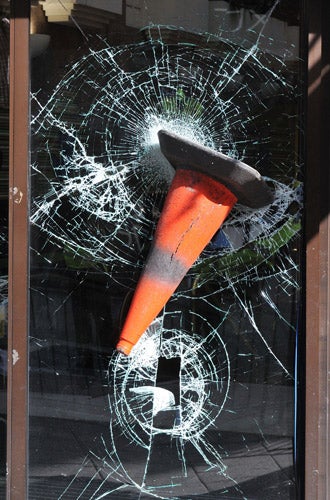How gangs have taken the place of parents in urban ghettoes
Ian Burrell explores the backgrounds of the London rioters

Your support helps us to tell the story
From reproductive rights to climate change to Big Tech, The Independent is on the ground when the story is developing. Whether it's investigating the financials of Elon Musk's pro-Trump PAC or producing our latest documentary, 'The A Word', which shines a light on the American women fighting for reproductive rights, we know how important it is to parse out the facts from the messaging.
At such a critical moment in US history, we need reporters on the ground. Your donation allows us to keep sending journalists to speak to both sides of the story.
The Independent is trusted by Americans across the entire political spectrum. And unlike many other quality news outlets, we choose not to lock Americans out of our reporting and analysis with paywalls. We believe quality journalism should be available to everyone, paid for by those who can afford it.
Your support makes all the difference.When a 26-year-old man became the first fatality of the riots yesterday, dying in hospital after he was shot in a car in Croydon the night before, it was a sad testament to the violence at the heart of the riots that have swept across London. But the incident also spoke to a deeper problem: the gang culture that suffuses the capital and seems to be a factor in the ongoing anarchy. The man had been shot after he and a group of friends had got into a row with another group, an altercation that ended in a car chase and the shooting. That incident appeared to have been the result of a long-standing rivalry.
The complexity of London's gang culture was further revealed by reports that warped appeals for gang unity had been taking effect, with hastily made alliances between the criminal groupings said to have been set up before Monday evening's looting. One constant throughout was surely hatred of the police. On one British "urban video" website, sympathisers with those in gangs gathered to discuss the burning and looting in Tottenham on Saturday.
Some voiced concern that the gangs were not sufficiently co-ordinated in their attacks on police: "I would love it if every click [clique] from north, south, east turned on feds am telling you a lot of fed man will quit their job. This should be the new wave f*** this click on click beef its [sic] pointless."
Other contributors were more graphic: "Man got duppied [killed] and all these north London dons are just doing is dashing rocks, burning shops and buses. Instead of them to try kill some of the fed man." Such is the bloody and perverse world of Britain's gang culture, where a code of the streets is ruthlessly enforced but nobody really seems to know the rules. "They are not organised criminal enterprises, they are mercurial and chaotic bodies," said John Heale, author of One Blood, a study of British street gangs.
It is a culture that has spread through Britain like a virus over the past 20 years. According to research by Scotland Yard's Specialist Crime Directorate in 2007, London has 257 street gangs. Senior police officers, former gang members, frontline workers and academics are due to meet in London at the end of next month for Britain's third conference on Tackling Gangs and Serious Youth Violence.
Although gangsterism is still a minority activity, more young people are being drawn into a minor affiliation, even those who do not take part in crime. The geographical identities of the gangs put an onus on all young men from a neighbourhood to show their allegiance, or risk being victimised. Gangs splinter or form alliances, creating a world that even those adults living in the middle of such activity find almost impossible to decipher.
Tottenham, Hackney and Peckham – where some of the worst rioting has taken place – are areas of some of the highest gang activity in Britain. And so, after several years of rising gang violence where rival crews targeted each other, the gangs have turned on the propertied classes.
It can hardly be a surprise. Barbara Wilding, one of Britain's most senior police officers, said, presciently, in 2008. "Tribal loyalty has replaced family loyalty and gang culture based on violence and drugs is a way of life."
Join our commenting forum
Join thought-provoking conversations, follow other Independent readers and see their replies
Comments